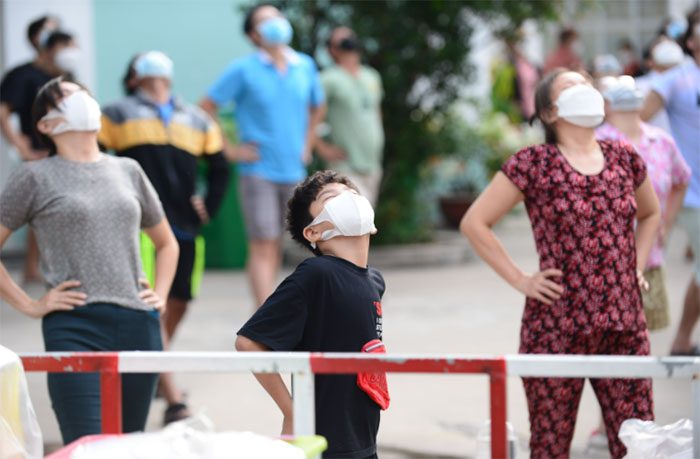According to recent research, rhythmic exercise, running, cycling, or walking can help alleviate symptoms of long Covid-19. The recommended exercise duration is about 30 minutes daily, which can be split into two sessions depending on individual fitness levels.
Research from the Pennington Biomedical Research Center (USA) indicates that regular exercise helps reduce symptoms of depression and diabetes associated with long Covid syndrome.

A Covid-19 patient exercising at the 3B Covid-19 Treatment Hospital, Phu Nhuan District, Ho Chi Minh City (photo taken on March 1) – (Photo: QUANG ĐỊNH).
According to a study published in the journal Exercise and Sports Science Reviews, existing evidence on long Covid suggests that inflammation caused by the SARS-CoV-2 virus can lead to a range of side effects in some post-Covid-19 patients, such as deteriorating mental health or disrupted insulin levels affecting blood sugar.
The study’s author, Dr. Candida Rebello from Pennington, suggests that this can create a “vicious cycle” leading to cellular dysfunction issues. However, exercising can help improve various problems, from psychological stress and inflammation to addressing insulin disorders.
Dr. Rebello also highlighted that previous studies indicate that long Covid syndrome damages the mitochondria that provide energy to cells, leading to patient fatigue. Therefore, moderate exercise can help restore mitochondria, aiding in disease resistance.
According to Dr. Rebello, both aerobic, cardiovascular, and anaerobic exercises (which break down glucose in the body without using oxygen, such as weight lifting) are beneficial for health, helping to reduce stress and inflammation associated with long Covid syndrome.
Notably, aerobic exercise significantly improves insulin sensitivity. Hence, running, cycling, or walking will be more effective methods for patients with underlying diabetes.
Based on general recommendations and the benefits derived from research, the appropriate exercise duration is about 30 minutes daily and can be divided into two sessions, depending on fitness levels. For those experiencing long Covid-19 syndrome leading to fatigue, the initial exercise duration may be shorter and can be gradually increased.
Dr. Rebello emphasized the need for more research to clearly identify the benefits of exercise for patients experiencing long Covid symptoms, and the National Institutes of Health (NIH) will fund such a study in the near future. She also stated that to reduce the risk of developing long Covid syndrome, everyone should establish a consistent and regular exercise habit.
According to data from the Centers for Disease Control and Prevention (CDC) in the United States, about 15-18% of Covid-19 patients experience long Covid symptoms. Previous studies have shown that the condition is likely to worsen in individuals who are inactive and often suffer from chronic diseases.


















































